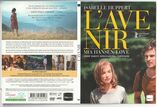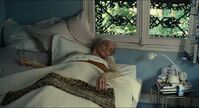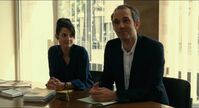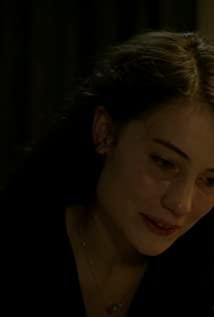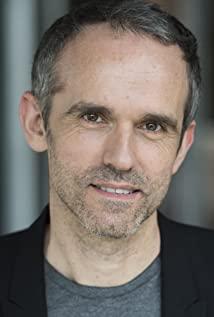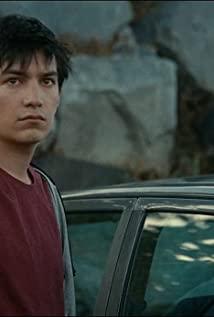Natalie
——She from "The Future"
Natalie, a philosophy teacher at a high school in Paris, immersed herself in a life of serenity and abundance, full of contentment. When life reaches a certain age, when the covenants of life seem to collapse one by one, the defense of life by the philosophy she relies on does not make her not grieve for everything that has passed, but philosophy gives her invisible faith and richness, which makes her The loss of life is enough to calm down. She rejects the passivity that life gives her, and she responds to life with freedom to transcend, not abandon. She didn't keep looking back, to measure the way she had come, and the days went on, and nothing ever interrupted her.
Natalie has a happy family and lives a relatively comfortable middle-class life. Her husband and herself are both engaged in philosophy teaching and have a pair of children. She loves her work, guides students into philosophy, teaches them to think independently, and gives meaning to their own lives while giving meaning to the world. As an experienced philosophy teacher, Natalie has a long-term cooperation with the publishing house, and is responsible for writing philosophy textbooks and some philosophy essays. Life seems to be progressing in near perfection...
Years later, when Natalie was nearly 50, the life she was accustomed to began to deviate from the track without warning. The connections she believed in her life disappeared one by one, and she was defined and denied standing on the opposite side of the world that was not understood by the world.
end of marriage
Her husband Hans, who has lived together for 25 years, concealed his infidelity for many years, and finally chose to leave her.
In her eyes, her husband is a thoughtful person who has not changed since he was 18 years old. He upholds Kant's "stars in the sky are bright, and conscience shines in the heart", and regards it as his only belief.
Daughter Chloe, after learning of her father's derailment, hopes that whatever choice he makes, he will make a decision as soon as possible. Coming home from get off work one day, Hans told Natalie that he had met a woman, and she told Hans, "Isn't he the only one who knows? But when Hans offered to move in with his lover, she realized that Her husband is going to leave her, and the marriage is disintegrating at this moment. She was deceived and felt angry, thinking that she was stupid, and still believed that her husband still loved her.
When she encounters a sudden change in marriage, she will be frustrated, resentful, unwilling to share a room with Hans for lunch, hide in the park to correct her homework, and even get angry with the flowers that Hans bought and throw them in the trash.
When the relationship between two people in a marriage ends, it is necessary to give up the connection with that person, say goodbye to some habits of having that person involved, let go of some things that once shared, and let go of the memory related to that person.
This may be the last time she will come to the holiday house, which is the house of her husband and parents by the sea, where she spends all her vacations after marriage, and spends a lot of effort in repairing the flowers and plants there. The husband said she could still come with the children in the future but he was not there, and she insisted on taking all her belongings from the holiday home. Sitting in the car leaving the holiday home, looking out the window, Natalie had tears in her eyes, and the reality of life had to push her to say goodbye to these people and things.
Faced with the sudden break-up of her 25-year marriage in silence, she would be frustrated. The philosophy she relied on to defend her life didn't make her feel sad for everything that had passed, but philosophy gave her invisible faith and richness. The intellectual precipitation of age and experience made her think that this is not serious, and her life has not completely failed because of this. She doesn't complain too much about the sudden changes in her life, and firmly believes that she has a full intellectual life, which is enough to make her feel happy and content.
mother's death
Most of the troubles in Natalie's life come from her mother, who is both her trouble and her responsibility.
My mother had worked as a model and had been married three times. She was frail and sick from a young age, her parents died early, and she was brought up by her grandmother. Her biggest regret is that she didn't go to school, so she forced Natalie to go to college to complete her studies. Her mother was very proud of her daughter being a philosophy teacher.
Anxiety mothers would keep calling Natalie at 5 a.m., even while she was at work, telling her she was going to kill herself or that she was dying. The fire department was alerted three times a week, and each time it was a false alarm. The mother, who could not be alone, refused to go to the nursing home. As the only daughter, Natalie once brought her mother home, but her mother would sleep in her bed and even forget her own. The daughter has a husband. As her mother's anxiety continued to worsen, she did not hesitate to spend a lot of money to send her mother to a top nursing home. The nursing home full of elderly people was full of lifeless breath. Facing the helplessness of life, she blamed herself and felt sad. In the nursing home, her mother hardly left her room, and often went on hunger strike to force her to come to the nursing home to see her.
One day, on her way home from watching a movie, she received news that her mother died suddenly after a fall.
I don't know which age in life would be easier to accept the death of my parents, but life pushes us to keep walking. It seems that the increase of age makes it easier to unload this sadness between the eyebrows and eyes and put it in the heart.
Natalie followed her mother's wishes and took care of her mother's funeral.
Life presented her with torture, the children left the house, the marriage ended, the mother died, and she began to face life alone.
When society's definition of "no longer appropriate" negates her
As a philosophy teacher with senior teaching experience, Natalie has a long-term cooperation with the publishing house, and is responsible for writing philosophy textbooks and some philosophy essays.
When the troubles of life have not dissipated, the negation of her at work seems to strike her as an appointment.
The publishing house, citing poor sales, will optimize her essay series in response to market expectations. In order to increase the appeal and modernity, Natalie will even need to compromise and accept serious philosophical essays with ads like gummy bears. cover.
After the publisher's re-evaluation, even if Natalie compromised, her philosophical essay series was judged to be unsatisfactory, even if repackaged, and was suspended. Even the publishing house decided not to publish the old version of the course materials she wrote, and will stop cooperating with her on books other than those under contract. Then the publishing house questioned the content of the Frankfurt School she was writing, and she accepted it calmly without complaining.
When classics need to give way to trends, when life reaches a certain age, it seems that it is always necessary to calmly accept the social definition of "no longer suitable" or even negation, and it is necessary to let go of the privileges only enjoyed by youth.
placed on the opposite of youth
Her most proud student, Fabian, has been helping her write philosophy textbooks since graduating from University. During the period when Fabian's father died of a serious illness, it was Natalie's class that exposed him to philosophy and entered philosophy. When a crack appeared in Natalie's life, Fabien decided to leave Paris and settle on a farm he bought with a friend in the Vercors mountains.
According to the principle of fair distribution, the husband took away half of the books in the family, took Levinas, who was full of notes, and left Schopenhauer, but instead of asking Hans to come back, she chose to buy the book. Got a new Levinas.
During the summer vacation, she decided to go to Fabian. In Fabian's car, she heard folk songs. After 25 years of living together, she and her husband listened to the same music. She was exposed to new music and was in a new space. She temporarily gave life to her. All her sadness shifted, and her face showed a long-lost joy.
After her mother died, she adopted her mother's cat Pandora. She took Pandora to the mountains. When the domestic cat Pandora left the house and ran to the mountains, she was worried that Pandora, who had never been out, would not survive outside for 5 minutes. Fabian comforted her without questioning. Cat's survival instinct, Pandora, who had not returned overnight, brought a mouse back as a trophy the next morning.
She came to the mountains, walked into the forest, climbed the hillside, in the wilderness, lying on the endless hillside, enjoying reading without being disturbed by anyone, enjoying loneliness and freedom.
She has always insisted on the unity of life needs and thoughts, but her student Fabian doesn't think so. She thinks that she will never go beyond the inner level in the unity of knowledge and action. She only cares about her daily behavior and will not let it harm her. and their own values, but can’t accept letting their minds get out of control and lead to dramatic changes in their lives. Fabian believes that her teacher Natalie went to the demonstrations when she was young, just to follow the crowd, enough to make her feel like an intellectual, which would make her feel comfortable, but not jeopardize her way of life. Fabi'an, who couldn't defend herself against extreme ideology, questioned Natalie, who was not enthusiastic about revolution, not being kind enough to make her feel hurt and broke through her last psychological line of defense.
The bitter truth suddenly unfolded at a certain point in life, the children grew up and left home; the 25-year marriage ended silently after learning of her husband's betrayal; the mother who suffered from anxiety suddenly passed away; the cooperation with the publishing house was rejected. Stop, from the definition and denial of society; it hurts her thinking, philosophical beliefs, way of life to be questioned by her most beloved student. In the face of life's collapse, she would cry in the morning, and she even lied to go back to Paris, to get rid of the world that made her feel buried in the minds of young people and not understood.
Back in Paris, she continued to work and live. In her way, as always.
After visiting Fabien at Christmas, she returned to Paris and found her ex-husband sitting in the living room. She and her ex-husband asked for the keys, gave him the Schopenhauer he had left behind, and signaled to her ex-husband to leave as soon as possible for convenience. She prepares Christmas dinner for the children. Her ex-husband hinted at her willingness to stay and have dinner with them, and in her unhesitating refusal, she also mused about the moment she came to the door. As the days continue to move forward, she accepts the past in her life and practices her own unity of knowledge and action.
Life collapsed one by one, but she didn't let it go, she refused the passivity that life gave her.
The Schopenhauer left by her husband Hans may be the guide that life left her - the will to life is the power that dominates the operation of the world. Like Pandora's house cat, we are all governed by the will to live, enough to be in life and let the days go on.
This article was first published on the WeChat public account [I used to live so lonely]
Author: Zhaomu Shouzo
An intellectual woman facing the passing of life
View more about Things to Come reviews



